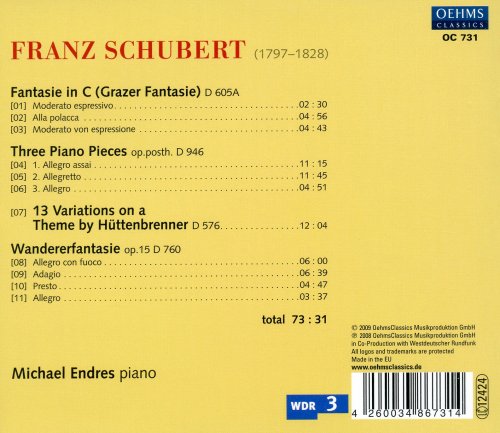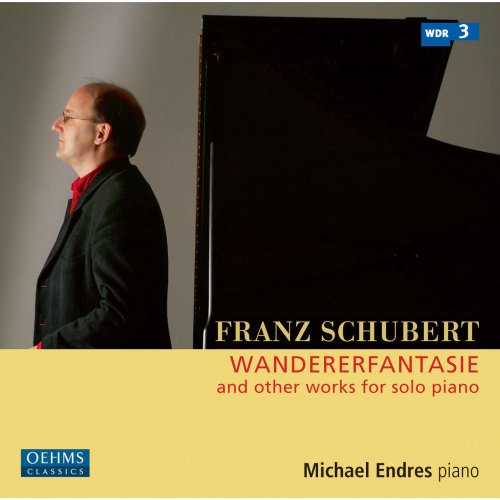
Michael Endres - Schubert: Wanderer-Fantasie & Other Works for Solo Piano (2016)
BAND/ARTIST: Michael Endres
- Title: Schubert: Wanderer-Fantasie & Other Works for Solo Piano
- Year Of Release: 2016
- Label: Oehms Classics
- Genre: Classical Piano
- Quality: flac losslesst
- Total Time: 01:13:28
- Total Size: 209 mb
- WebSite: Album Preview
Tracklist
01. Fantasy in C Major, D. 605a "Grazer": Moderato con espressione
02. Fantasy in C Major, D. 605a "Grazer": Alla polacca
03. Fantasy in C Major, D. 605a "Grazer": Tempo I
04. 3 Klavierstücke, D. 946: No. 1, Allegro assai
05. 3 Klavierstücke, D. 946: No. 2, Allegretto
06. 3 Klavierstücke, D. 946: No. 3, Allegro
07. 13 Variations on a Theme of Hüttenbrenner, D. 576
08. Fantasy in C Major, Op. 15, D. 760 "Wandererfantasie": I. Allegro con fuoco ma non troppo
09. Fantasy in C Major, Op. 15, D. 760 "Wandererfantasie": II. Adagio
10. Fantasy in C Major, Op. 15, D. 760 "Wandererfantasie": III. Presto
11. Fantasy in C Major, Op. 15, D. 760 "Wandererfantasie": IV. Allegro

This recording of Schubert's Wanderer Fantasie, D. 760, is hardly at risk of getting lost among all the other ones on the market; it's completely distinctive. Endres' reading is almost devoid of the Viennese warmth and rhythmic momentum that are the norm for Schubert, but in their place are details that are heard in wholly new ways. Look no further than the opening the Wanderer Fantasie itself, muscular yet subtle, for an example. Everywhere, Endres chooses to destabilize rhythms in order to tease out details of voice-leading, and even the relatively simple triple meter of the second of the impromptu-like Three Piano Pieces, D. 946, is done in such a way that the music seems to float, not drive forward. These late works are less often performed than are the two full sets of Schubert impromptus, but Endres makes a good case for them as ambitious, motivically complex pieces. Even less familiar are the 13 Variations on a Theme by Hüttenbrenner, D. 576, from 1815, which have a theme so simple that it seems analogous to a few straight lines sketched on a page; Endres catches the way the young Schubert's slightly scary imagination immediately takes over. Also comparatively rare is the so-called Grazer Fantasie, the Fantasie in C major, D. 605a; it's a true quasi-improvisatory piece, Schubert's version of the potpourris and display pieces performed by the touring virtuosi who passed through Vienna. The alla polacca middle section (track 2) does not come out particularly polonaise-like in Endres' account, and in general listeners with a low tolerance for intellectual German approaches may be rubbed the wrong way by his playing. Take it for what it is, however, and the music has the uncanny quality of seeming quite different when heard multiple times. The engineering from the Oehms label is up to its usual high standard.
01. Fantasy in C Major, D. 605a "Grazer": Moderato con espressione
02. Fantasy in C Major, D. 605a "Grazer": Alla polacca
03. Fantasy in C Major, D. 605a "Grazer": Tempo I
04. 3 Klavierstücke, D. 946: No. 1, Allegro assai
05. 3 Klavierstücke, D. 946: No. 2, Allegretto
06. 3 Klavierstücke, D. 946: No. 3, Allegro
07. 13 Variations on a Theme of Hüttenbrenner, D. 576
08. Fantasy in C Major, Op. 15, D. 760 "Wandererfantasie": I. Allegro con fuoco ma non troppo
09. Fantasy in C Major, Op. 15, D. 760 "Wandererfantasie": II. Adagio
10. Fantasy in C Major, Op. 15, D. 760 "Wandererfantasie": III. Presto
11. Fantasy in C Major, Op. 15, D. 760 "Wandererfantasie": IV. Allegro

This recording of Schubert's Wanderer Fantasie, D. 760, is hardly at risk of getting lost among all the other ones on the market; it's completely distinctive. Endres' reading is almost devoid of the Viennese warmth and rhythmic momentum that are the norm for Schubert, but in their place are details that are heard in wholly new ways. Look no further than the opening the Wanderer Fantasie itself, muscular yet subtle, for an example. Everywhere, Endres chooses to destabilize rhythms in order to tease out details of voice-leading, and even the relatively simple triple meter of the second of the impromptu-like Three Piano Pieces, D. 946, is done in such a way that the music seems to float, not drive forward. These late works are less often performed than are the two full sets of Schubert impromptus, but Endres makes a good case for them as ambitious, motivically complex pieces. Even less familiar are the 13 Variations on a Theme by Hüttenbrenner, D. 576, from 1815, which have a theme so simple that it seems analogous to a few straight lines sketched on a page; Endres catches the way the young Schubert's slightly scary imagination immediately takes over. Also comparatively rare is the so-called Grazer Fantasie, the Fantasie in C major, D. 605a; it's a true quasi-improvisatory piece, Schubert's version of the potpourris and display pieces performed by the touring virtuosi who passed through Vienna. The alla polacca middle section (track 2) does not come out particularly polonaise-like in Endres' account, and in general listeners with a low tolerance for intellectual German approaches may be rubbed the wrong way by his playing. Take it for what it is, however, and the music has the uncanny quality of seeming quite different when heard multiple times. The engineering from the Oehms label is up to its usual high standard.
Year 2016 | Classical | FLAC / APE
As a ISRA.CLOUD's PREMIUM member you will have the following benefits:
- Unlimited high speed downloads
- Download directly without waiting time
- Unlimited parallel downloads
- Support for download accelerators
- No advertising
- Resume broken downloads


